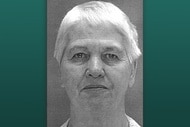Create a free profile to get unlimited access to exclusive videos, breaking news, sweepstakes, and more!
Letters From Son Of Sam And The BTK Killer Were Inspiration For Fictional Serial Killer
Criminologist Dr. Scott Bonn's novel "Evil Guardian" is based on his correspondence with notorious serial killers Dennis Rader (the BTK Killer) and David Berkowitz (Son of Sam).

Many of us are fascinated by serial killers, but not many of us (luckily!) get the opportunity to get to know one in real life. Criminologist Dr. Scott Bonn did just that when he started a letter correspondence with both Dennis Rader, aka the BTK Killer, and David Berkowitz, aka Son of Sam, from 2011 to 2013 for a non-fiction book about serial killers.
Bonn said he exchanged dozens of letters with both serial killers. In fact, he even visited Berkowitz in prison (pictured). Now those interactions have been used as inspiration for Bonn’s new novel, "Evil Guardian," a book about a serial killer named Charles Lundquist who preys on young women and claims that he is serving God by killing them. The title refers to the fact that Lundquist is also a chaplain at a women’s correctional facility and refers to himself as The Guardian.
“This experience of being in close contact with these two individuals inspired me to create a novel of my own,” Bonn told Oxygen.com.
So how did his correspondence with the killers influence the novel?
First, some background info: Rader murdered 10 people between 1974 and 1991 and gave himself the nickname BTK, which stands for his self-professed modus operandi — Bind, Torture, Kill. Berkowitz killed six and wounded seven between 1976 and 1977. Both terrorized the areas they lived in and toyed with the media.
Bonn said the serial killer in his book is one part Berkowitz, one part Rader, and one part serial killer Jeffrey Dahmer, who killed 17 men and boys from 1978 to 1991.
“So the novel itself, my novel, is very factually based,” Bonn explained. “It’s really immersed in forensics, criminal psychology, and all the things I’ve been trained in.”
Bonn described Lundquist as a prison chaplain who’s trying to do good, but is frustrated with the realities of the job, “where all that he sees is misery and no one is redeemed.”
He explained that Lundquist believes that God is telling him to kill these girls — which is similiar to Berkowitz's story. In real life, Berkowitz said he received instructions to kill from his neighbor's dog, who Berkowitz claimed contained the soul of a 6,000-year-old man named Sam (hence the nickname "Son of Sam.") In the 1980s, he converted to Christianity and now goes by "Son of Hope." Tapes of him giving sermons are for sale, and a small group of Christians think of him as proof that even the most evil of people can be saved. A few people have even compared him to Paul the Apostle, who also committed misdeeds before being "saved."
Bonn confirmed that the Guardian’s character has the visionary aspects of Berkowitz, although they differ somewhat.
“[Berkowitz] was what was known as ‘Satan-mandated.’ Berkowitz believed that Satan was telling him what to do, whereas the Guardian is God-mandated.”
Rader also had ties to religion. He was the president of his Lutheran Church Association.
“He [the serial killer character] also loves his work, so just like Jeffrey Dahmer, and just like BTK, he’s compelled to have sex with these individuals for his own lustful reasons, and the way he makes peace with that is you should love your work,” Bonn said, adding that the character’s hedonistic parts are based on Rader and Dahmer, who both got sexual satisfaction through killing their victims.
“And like both BTK and David Berkowitz, he sends letters to the media taunting [...] this homicide captain who becomes obsessed with catching him,” Bonn explained.
He called both Rader and Berkowitz "aggressive self-promoters" who “built their own brands, so to speak.” They even gave themselves their own brand names: BTK and Son of Sam, as Bonn points out.
“They were very aware of public scrutiny, they were very aware that they were shocking and terrorizing the public, and that was a big part of their goal,” Bonn said. “They loved to manipulate the press, manipulate the police, and manipulate the public.”
Bonn explained that the fictional Lundquist also has the arrogance and power-control aspects of BTK.
“Just the tremendous arrogance and narcissism of BTK is in the Guardian’s character; he just thinks he’s the smartest kid in school — you know, ‘No one can catch me!” he elaborated.
Bonn added that for Rader, it was all about domination.
“He would stalk people, watch them for a while,” he said. “He didn’t pick them randomly. He would watch them. He would pick his moment when he was going to abduct them. He would take them somewhere. He would torture them. He would kill them. He would have sex with their corpse. He would have a whole script written out at the desk.”
For Rader, it was all about the power and the control over life and death.
“A direct quote from him — he was a strangler, because he needed skin-to-skin contact — and as he strangled the life out of these women, he said, ‘I knew I was God,’” Bonn explained. “You can’t get much sicker than that.”
[Photo: Provided]


























